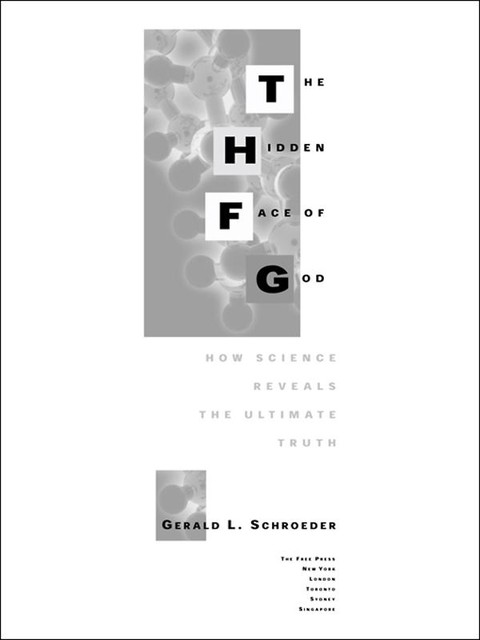We use cookies to improve the Bookmate website experience and our recommendations.
To learn more, please read our Cookie Policy.
To learn more, please read our Cookie Policy.
Accept All Cookies
Cookie Settings
Something went wrong. Try again.

Read in our apps:
iOS
·Android
Gerald Schroeder
The Hidden Face of God
Notify me when the book’s added
Impression
Add to shelf
Already read
Report an error in the book
Share
Facebook
Twitter
Copy link
To read this book, upload an EPUB or FB2 file to Bookmate. How do I upload a book?
An MIT-trained scientist explores how recent research provides reasons for faith—and hints about the ultimate nature of reality.
Gerald Schroeder, who has worked in both physics and biology, has emerged in recent years as one of the most popular and accessible apostles for the melding of science and religion. He first reconciled science and faith as different perspectives on a single whole in The Science of God. Now, in The Hidden Face of God, Schroeder takes a bold step forward to show that science, properly understood, provides positive reasons for faith.
Recent research in biology, chemistry, physics, and neuroscience contains unmistakable hints about the ultimate nature of reality. Simply put, we now know not only that behind matter lies energy, but also that behind energy lies wisdom. Scientists have touched on this wisdom in the laboratory, and its implications are awesome.
From the wisdom encoded in DNA and analyzed by information science, to the wisdom unveiled in the fantastic complexity of cellular life, to the wisdom inherent in human consciousness, this book offers a tour of the best of modern science. Schroeder makes no attempt to “prove” the existence of God. Yet his interpretations of the work of his fellow scientists touch on life’s ultimate mysteries. His wise observations on the organization of organic life, on the power of humans to make sense of their sensory inputs, and on the complexities of the code of DNA all show that life has a direction and purpose that cannot be explained in purely physical terms. Throughout, he addresses three great themes: the question of first causes (i.e., where do the laws of nature come from?); the inseparability of mind and matter; and the philosophical problem of design. To believe that a designer must have been involved, he reminds us, we need not insist on perfection or on our view of perfection in the design. The Hidden Face of God will open a world of science to religious believers, and cause skeptics to rethink some of their deepest beliefs.
“His enthusiasm and sense of wonder are personally engaging, and his metaphysical speculations reflect a wry humility that cannot be taken for granted in this genre.” —Publishers Weekly
“At the heart of the cell, in the depths of the quasar, lies a deep wisdom encoded in a unified chain of information. Let rigid atheists and biblical literalists take a pass, but this book deserves widespread circulation among readers still alive to the hidden harmonies of the universe.” —Booklist
Gerald Schroeder, who has worked in both physics and biology, has emerged in recent years as one of the most popular and accessible apostles for the melding of science and religion. He first reconciled science and faith as different perspectives on a single whole in The Science of God. Now, in The Hidden Face of God, Schroeder takes a bold step forward to show that science, properly understood, provides positive reasons for faith.
Recent research in biology, chemistry, physics, and neuroscience contains unmistakable hints about the ultimate nature of reality. Simply put, we now know not only that behind matter lies energy, but also that behind energy lies wisdom. Scientists have touched on this wisdom in the laboratory, and its implications are awesome.
From the wisdom encoded in DNA and analyzed by information science, to the wisdom unveiled in the fantastic complexity of cellular life, to the wisdom inherent in human consciousness, this book offers a tour of the best of modern science. Schroeder makes no attempt to “prove” the existence of God. Yet his interpretations of the work of his fellow scientists touch on life’s ultimate mysteries. His wise observations on the organization of organic life, on the power of humans to make sense of their sensory inputs, and on the complexities of the code of DNA all show that life has a direction and purpose that cannot be explained in purely physical terms. Throughout, he addresses three great themes: the question of first causes (i.e., where do the laws of nature come from?); the inseparability of mind and matter; and the philosophical problem of design. To believe that a designer must have been involved, he reminds us, we need not insist on perfection or on our view of perfection in the design. The Hidden Face of God will open a world of science to religious believers, and cause skeptics to rethink some of their deepest beliefs.
“His enthusiasm and sense of wonder are personally engaging, and his metaphysical speculations reflect a wry humility that cannot be taken for granted in this genre.” —Publishers Weekly
“At the heart of the cell, in the depths of the quasar, lies a deep wisdom encoded in a unified chain of information. Let rigid atheists and biblical literalists take a pass, but this book deserves widespread circulation among readers still alive to the hidden harmonies of the universe.” —Booklist
more
This book is currently unavailable
284 printed pages
- Original publication
- 2001
- Publication year
- 2001
Have you already read it? How did you like it?
👍👎
fb2epub
Drag & drop your files
(not more than 5 at once)

